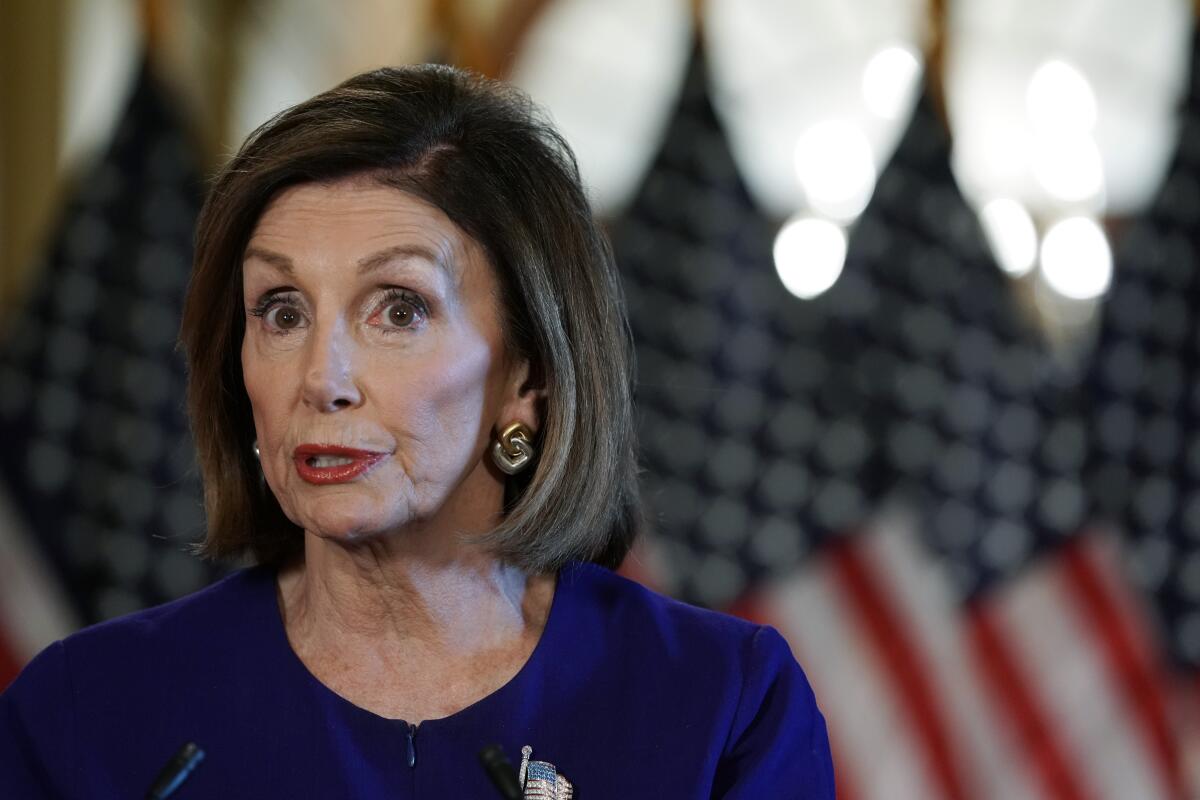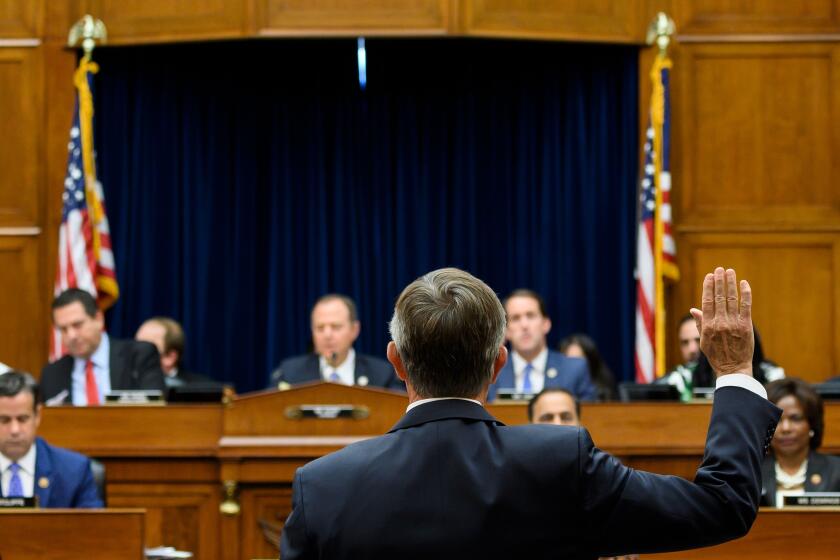The Mueller probe was a dead end for Democrats. Ukraine looks much more promising

- Share via
WASHINGTON — After months of talk about a wide range of possible grounds for impeachment, House Democrats are preparing to make a narrow case to the American public that the president should be removed from office for seeking the help of a foreign country to interfere in the 2020 election.
Trump’s acknowledgment that he withheld congressionally approved aid from Ukraine while pushing its leader to investigate former Vice President Joe Biden has breathed new energy and focus into the Democrats’ impeachment effort.
“Right now, we have to strike while the iron is hot,” Speaker Nancy Pelosi, who previously had been opposed to moving ahead on impeachment, told her caucus in a closed-door meeting Tuesday night. “This is a national security issue — a national security issue — and we cannot let him think that this is a casual thing, so that’s where I’m at.”
What’s an impeachable offense? A president misusing his power to benefit himself.
Democrats are betting that the Ukraine allegations are far more straightforward and easier for Americans to understand than special counsel Robert S. Mueller III’s long, convoluted inquiry into Russian collusion and obstruction of justice, which at times veered into salacious details such as payoffs to porn stars.
The issue also allows Democrats to make the case that they’re concerned about actions that directly involve national security, and that occurred just two months ago, not while Trump was a candidate.
Perhaps best of all from Democrats’ perspective is that the latest allegations have largely unified the party’s lawmakers. Even moderate Democrats who must run in districts that Trump won in 2016 have joined the impeachment bandwagon in recent days.
Underscoring the relatively frenetic way in which Democrats quickly coalesced around impeachment is the fact that the strategy has shifted just as fast.
Pelosi (D-San Francisco) said Tuesday that six committees would investigate and compile their most compelling case and send it to the Judiciary Committee, which would write the articles of impeachment. It is now clear that while all of those investigations will continue, the centerpiece of the case will come from the House Intelligence Committee, which is investigating the Ukraine accusations.
Ukraine “goes right to the top of the list,” said Rep. Jamie Raskin (D-Md.), a member of the House Judiciary Committee.
The acting director of national intelligence is scheduled to testify to Congress Thursday over a still-secret whistleblower’s complaint and inspector general’s investigation that are key to the Democrats’ impeachment inquiry.
“I think focusing on this Ukrainian scandal singularly is important,” said Rep. Ted Lieu (D-Torrance), who helps run messaging for House Democrats. “It takes everything to a whole new level, because you have the president as president using his powers to shake down a foreign leader to benefit him politically, to deny critical aid to an ally at an important time, when they’re getting attacked. I think everyone realizes there is an urgency to this Ukrainian issue. It is relatively easy to explain, and it is such a gross abuse of power.”
The new focus also seems likely to mean that Rep. Adam B. Schiff (D-Burbank), chairman of the House Intelligence Committee, will take on a larger role as a leading face of the Democratic inquiry, eclipsing — for now — Rep. Jerrold Nadler of New York, the head of the House Judiciary Committee. Schiff is a Pelosi ally, and many Democrats, especially moderates, view him as a more effective spokesman than Nadler.
The focus on Ukraine, however, carries political risks. Democrats don’t yet know the full story. The whistleblower whose complaint kicked off the investigation is not yet publicly known, and Republicans have already painted him or her as a partisan. The full whistleblower complaint went only to a small group of lawmakers late Wednesday. If the whistleblower’s credibility falls apart, so could the Democrats’ case.
Some Democrats are urging caution. “I didn’t really sense a huge amount of pressure [in the account of the conversation between Trump and the president of Ukraine],” said Rep. Jefferson Van Drew (D-N.J.), adding he would like to see the full complaint before reaching a decision.
By the time Nancy Pelosi agreed to an impeachment inquiry, California’s vulnerable freshmen had already come out for the action.
Republicans have largely accused Democrats of rushing to impeachment or said the evidence has not established that Trump used the Ukraine aid as leverage to push the investigation of Biden. Sen. Tim Scott (R-S.C.) summed it up as a “nothing burger.” So far, there is little sign of the bipartisan support Pelosi long said would be necessary to pursue impeachment.
A few GOP lawmakers voiced concern or were reserving judgment until more evidence is revealed. Sen. Mitt Romney of Utah called the conversation “deeply troubling.” Sens. Susan Collins (R-Maine) and Lisa Murkowski (R-Alaska) refused to weigh in on the document Wednesday.
Just weeks ago, some Democrats privately admitted that the impeachment effort was at risk of losing steam. Now there is almost universal agreement that Trump’s interactions with Ukraine President Volodymyr Zelensky amount to the high crimes and misdemeanors that warrant impeachment.
Even Trump appeared concerned about the Democrats’ new momentum. Referring to impeachment, he said at a news conference Wednesday: “I thought we won. I thought it was dead.”
Democrats are already fine-tuning their messaging around the issue.
“We’re working on clarifying, laying it out in simple terms: This is what it is. This is why it’s so important. This is why we can’t wait. And this is the tipping point,” said Rep. Katie Hill (D-Agua Dulce), a member of the House Democratic leadership who had opposed impeachment until this week.
The Russia investigation and Mueller’s report did not resonate with wide swaths of the public who weren’t able to track the people involved and the complex allegations.
“Ukrainegate,” as Rep. Donna Shalala (D-Fla.) dubbed it, is more straightforward.
“This is so much more clear-cut,” Hill said of the Ukraine allegations compared with the Russian allegations. “Now you have somebody who was in a position of power, who abused that power, has admitted on TV, along with his lawyer, that they abused that power, and has released a transcript showing that exact same thing.”
Times staff writer Sarah D. Wire contributed to this report.
More to Read
Get the L.A. Times Politics newsletter
Deeply reported insights into legislation, politics and policy from Sacramento, Washington and beyond. In your inbox twice per week.
You may occasionally receive promotional content from the Los Angeles Times.













